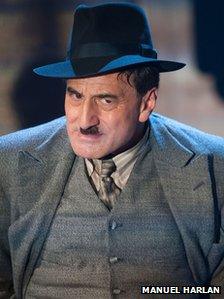Henry Goodman on Brecht's Hitler satire Arturo Ui
- Published

Henry Goodman as Chicago racketeer Arturo Ui
For his latest stage role, actor Henry Goodman has had to immerse himself in the history of Hitler.
Backstage at London's Duchess Theatre, Goodman points out several black and white photographs of Adolf Hitler stuck around the edge of his dressing room mirror.
"It's scary," he explains, "but I must say that reading the biographies was a real education.
"It's a terrible problem that actors have - you've got to try not to love but to understand your character."
After two runs at Chichester in 2012 and 2013, Bertolt Brecht's parable play The Resistible Rise of Arturo Ui has arrived in the London's West End for the first time in more than 25 years.
Goodman is cast as small-time Chicago crime boss Arturo Ui, who sets out to grasp absolute power during the Great Depression of the 1930s.
The Hitler photographs have accompanied the 63-year-old London-born actor, who is Jewish, throughout this theatrical journey which began at Chichester's Minerva Theatre last summer.
In between his Brecht outings, Goodman won acclaim, external for his role as Arthur Winslow in Terence Rattigan's The Winslow Boy at the Old Vic in the spring.
But Arturo Ui is very different territory. The production, directed by Jonathan Church, makes some "dangerous choices," Goodman says.
Henry Goodman interview
"We do some quite brave, bold, physical, comedic things in a grotesque mode - it's not your lovely straight Winslow Boy narrative where the audience is gathered into a naturalistic reality."
Ui, with his toothbrush moustache, clearly represents Hitler, while other elements in the play echo events and characters in Hitler's life and the Third Reich.
"Ui starts out as a little nobody, a complete schmuck, a gangster who you can laugh at," says Goodman, slipping into the thick Brooklyn accent he uses on stage.
"You might think he's a Peter Sellers character but inside there's this hunger to reach the top. I'm playing somebody vicious and ugly and nasty - there's a lot of fun to be had with that."
Brecht wrote the play in 1941 while in exile in Finland waiting for his US visa. "He wrote it to warn the Americans that Fascism, specifically Nazism, could come to America," says Goodman.
"Brecht understood that Americans love stars. They make them, adore them and venerate them - especially gangsters, outlaws, and vicious murderers.
"He brought together that world and the [American] idea that everybody can get to the top. He says that philosophy of life is open to appalling misuse if the wrong person grabs hold of it."

Goodman first played the role at Chichester Festival Theatre in 2012
As part of his research for the role, Goodman visited Brecht's former home in Berlin. "In his bedroom I saw all these dime novels about cowboys and detectives, right next to a picture of Confucius."
He also watched the same movies that had inspired Brecht, such as the original Scarface and Charlie Chaplin's anti-Nazi satire The Great Dictator.
These influences apart, Goodman is aware that Brechtian drama can have a reputation for finger-wagging.
"We've gone out of our way not to be didactic," he says of Arturo Ui. "We've tried to find that balance, but it's politically engaged and that's why I wanted to do it."
Earlier this year, Mark Ravenhill's version of Brecht's A Life of Galileo opened to strong reviews at the RSC's Swan Theatre in Stratford-upon-Avon. With Arturo Ui opening in the West End, is Brecht now good box office?
"I hope it's never good box office," responds Goodman. "We've got to have someone who is disturbing, abrasive, unsettling. There's far too much anodyne 'everything goes' now. That's fatal.
"Most young people coming into theatre might think it's all about being on telly and being famous.
"I've been saying this for 40 years: I'm in theatre because it's a place of redress. There may be some delights and egotism in there somewhere in parading one's skills, but in the end it's to make a difference. Otherwise, what's the point?"
The Resistible Rise of Arturo Ui is at the Duchess Theatre, London, until 7 December.
- Published11 November 2010